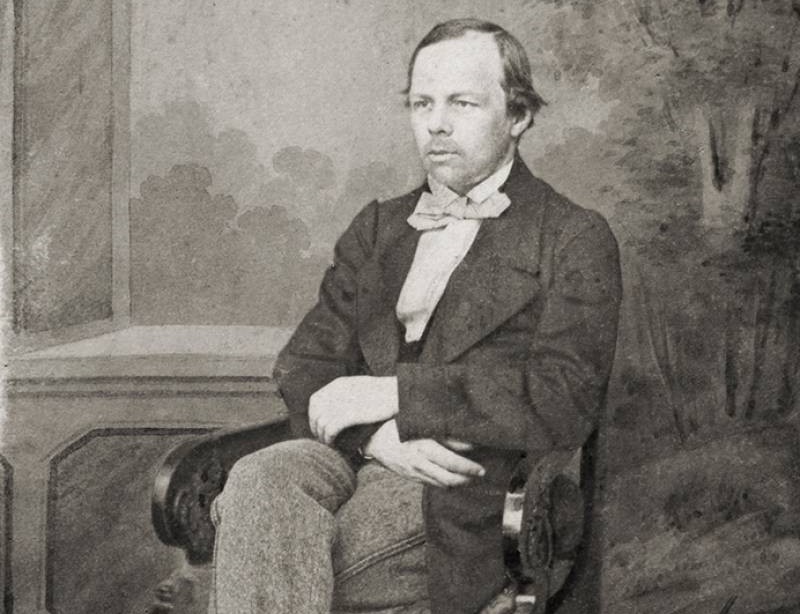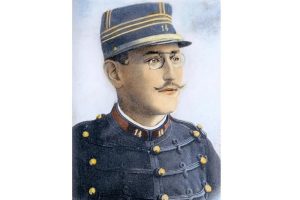Dostoevsky’s novel Demons was first serialized in The Russian Messenger, which also published Crime and Punishment. Over at Law & Liberty, Daniel J. Mahoney argues that Dostoevsky’s alternative to nihilism in the novel is “less convincing or compelling than his unerring diagnosis of the demons that are revolutionary nihilism, political atheism, ‘half-science’ or scientism, and an incipient totalitarianism that combines moral fanaticism with contempt for the primordial distinction between good and evil.” He continues:
At the heart of Demons is the revolutionary program of the nihilists themselves. Here Dostoevsky discerned where revolution leads with perfect accuracy. Pyotr Stepanovich champions the revolutionary program of Shilgalyov, a revolutionary theorist possessed by ideology of the most fanatical kind, and down to the smallest details. Shigalyov, the younger Verkhovensky almost madly proclaims “invented equality!” The new egalitarian despotism, “paradise on earth,” will self-consciously create “equality in slavery.” True freedom, Shigalyov insists, can only be found in “perfect despotism.” Everything must be levelled since high aspiration, spiritual or intellectual, gives rise to dreaded inequalities. Human greatness, high and noble aspiration, must be crushed and beaten out of the human soul. Slaves, we are told, need rulers, and egalitarianism demands despotism of an unprecedented variety.
This demonism knows no limits: Since higher abilities cannot be tolerated but instead must be warred on, nobility must be “banished or executed.” In this paradise-turned-nightmare, “Cicero’s tongue is cut off, Copernicus’s eyes put out, Shakespeare is stoned—this is Shigalyism!” Pyotr Stepanovich, following Shigalyov, unabashedly declares that there can be no freedom or equality without a truly inhuman and unprecedented kind of despotism.
In her response to Mahoney’s essay, Caroline Breashears argues that there are also lessons to be learned through the generational conflicts in the novel:
Dostoevsky prompts us to consider the ties between generations most brilliantly in Pyotr Stepanovich’s interactions with his father and the governor’s wife, Yulia Mikhailovna von Lembke. The father is appalled by his son’s willingness to go beyond advocating reforms to insisting on brutal controls and violence. Stepan Trofimovich even denies that his generation laid the foundation for such actions: “It was not for that, it was not at all for that we strove; I don’t understand any of it. . . . But do you understand, I cry to him, do you understand that if you have the guillotine in the forefront, and with such glee, it’s for the sole reason that cutting heads off is the easiest thing, and having an idea is difficult!” Stepan Trofimovich is certainly right that execution requires less intellectual work than philosophy, but he remains morally blind to how his generation led to the ideas of the next.
Jessica Hooten Wilson, for her part, sees a warning to teachers: “Dostoevsky warns us against what Niebuhr calls ‘soft utopias’ in which, as Mahoney writes, children are taught ‘to laugh at God’ and academics refuse to use a word like ‘evil.’ These bad ideas being passed down by our teachers and watchmen will lead us to an embrace of ideology in which we can no longer tell the righteous from the wicked.”
In case you missed it, Jacob Howland revisited the novel last year for The New Criterion:
No one understands late-modern liberal oligarchs and their nihilistic children better than Dostoevsky. Turgenev attempted to do so in Fathers and Sons, a fine little European novel that portrays the old liberals and young radicals of the early 1860s as exhausted, ineffective opponents. In that book, Pavel Petrovich defends personal dignity, individual rights, duties, faith, and the painter Raphael. He challenges his nephew’s friend Bazarov to a duel, but his shot goes wide. For his part, the young nihilist only wounds Pavel and dies of an infection from dissecting a corpse not forty pages later. Although Stepan justly complains that “Bazarov is some sort of false character, who doesn’t exist at all,” Dostoevsky metafictionally acknowledges his debt to Turgenev in amusing ways. Told that the radicals are “a force,” Pavel dismisses them as a mere “four men and a half”; Dostoevsky’s Verkhovensky makes a revolutionary cell of “just three men and a half.” But in depth of understanding and literary power, Demons devours Fathers and Sons.
I don’t agree with that last line, but do read the rest.
In other news
What exactly is the task of a “diversity auditor” at Bard’s Stevenson’s Library, Faith Bottum wonders:
The point of the audit at Bard originally appeared to be picking books to remove. The announcement in Notes, the library’s newsletter, described the project as a first step in “the process of decanonizing the stacks”—academic jargon for breaking the connection to the past. A follow-up from the staff seemed to suggest that the eventual aim is a major deaccessioning (to use a librarians’ term: litotes for getting rid of books). A representative of the library, however, later said in an email that was forwarded to me that the project was designed “to increase our understanding of our collection, not to remove books.” This leaves unspecified the reason the information is being gathered in the first place, but the librarian waved away the students funded by the Office of Inclusive Excellence, stating that actual librarians will decide about the library’s collections, not student workers. And perhaps this audit is merely a sop to activist students and diversity administrators. But it does seem at least a surrender to the idea that content is determined by the extraliterary characteristics of the author.
The other Rome: “These four books describe a remarkable society that once stood like a colossus between the Danube and the Euphrates, and was governed from its newly built capital, Constantinople (modern Istanbul). In the year 450 CE, at a time when the Roman Empire was about to vanish from Western Europe, there emerged a different Rome, a Roman Empire of the East, which survived for a millennium. For Christians of the East (including the Orthodox Slavs) and also for Muslims, this Rome—the New Rome of Constantinople—was the only Rome that mattered.”
Van Gogh’s God: “In letters, Van Gogh claimed he tried to capture the incandescent beauty of nature, radiant with a glory beyond nature. But even a modestly theological description of Van Gogh’s work will provoke protests. After theological training and a stint ministering among the poor, Vincent turned from the Dutch Calvinism of his parents. He abandoned the church after his pastoral call wasn’t renewed, scorned the religious art of his contemporaries, and almost never painted biblical scenes. Yet Van Gogh didn’t become a secular artist.”
Spanish colonialism and the rise of chocolate:
The drink rapidly popularised to become an everyday reality for all strata of the Novohispanic population, consumed – as observed by a contemporary – “among Spaniards, as well as among indigenous and mestizos, mulattos, negros and other people, [drunk] during fasting days, Lent and vigils, in the morning as well as in the afternoon, at night and at many times of the day.” In Ciudad de México, until the first half of the 17th century, chocolate could be acquired directly from natives on the street (until the latter were pushed out of its trade by Spanish and mestizo vendors) as cocoa paste in lozenge form, to which consumers could add what they pleased. Preparations ranged from the simplest one with water to more complex procedures with the addition of several spices and flowers, but the most popular way to consume it was hot with atole (a corn dough) . . . Claims of Spanish excellence in the art of chocolate production went hand in hand with an increasing identification of the product with Spanish culture. Chocolate took on such importance in 18th-century Spain that even the entry on chocolat in Diderot and d’Alembert’s Encyclopédie opens with an acknowledgment of its diffusion in Spain, stating that “lacking chocolate in Spanish homes is like here [in France] being so poor not to have bread”.
A journalist leaves the CBC:
For months now, I’ve been getting complaints about the Canadian Broadcasting Corporation, where I’ve worked as a TV and radio producer, and occasional on-air columnist, for much of the past decade. People want to know why, for example, non-binary Filipinos concerned about a lack of LGBT terms in Tagalog is an editorial priority for the CBC, when local issues of broad concern go unreported. Or why our pop culture radio show’s coverage of the Dave Chappelle Netflix special failed to include any of the legions of fans, or comics, that did not find it offensive. Or why, exactly, taxpayers should be funding articles that scold Canadians for using words such as “brainstorm” and “lame.” Everyone asks the same thing: What is going on at the CBC?
The liberal platitudes of Michael Ignatieff:
Raymond Williams once witheringly described Christopher Caudwell, an English Marxist critic who died fighting in the Spanish Civil War, as “not even specific enough to be wrong”. Reading Michael Ignatieff’s On Consolation, the phrase kept coming to mind, or rather my botched, inferior version of it: “not specific enough to be true” . . . A chronological suite of “portraits of particular men and women in history struggling to find consolation” – Western men and women (mostly men), from Job to Boethius, Montaigne to Abraham Lincoln, Marx to Primo Levi – On Consolation has two rhetorical modes: sprightly biographical narrative (thankfully predominant) and sententious philosophizing.


















